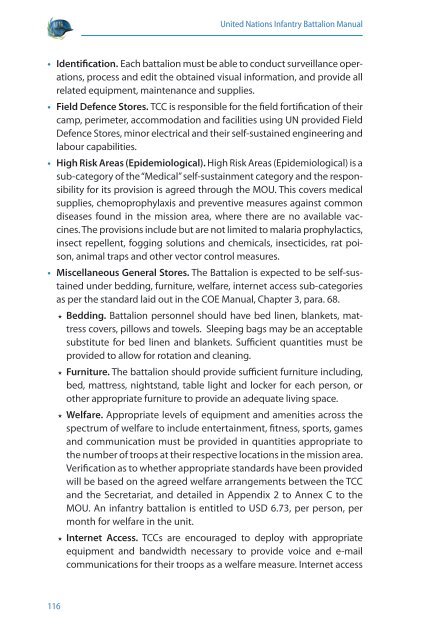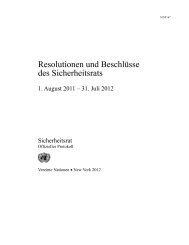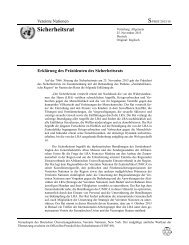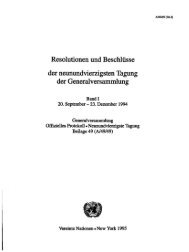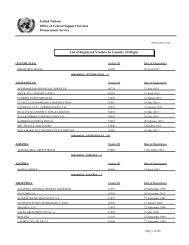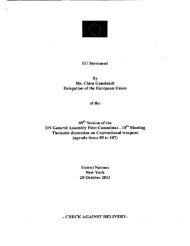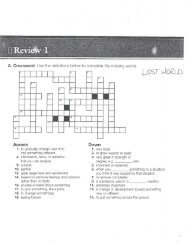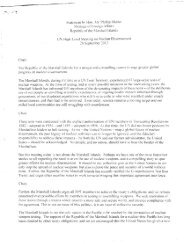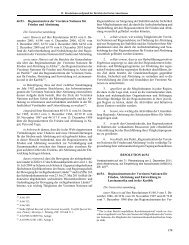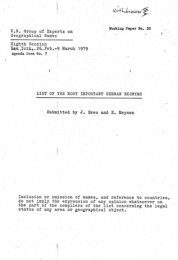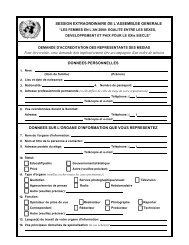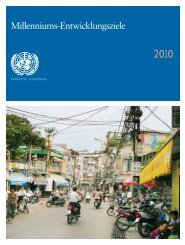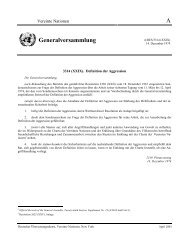United Nations Infantry Battalion Manual - the United Nations
United Nations Infantry Battalion Manual - the United Nations
United Nations Infantry Battalion Manual - the United Nations
You also want an ePaper? Increase the reach of your titles
YUMPU automatically turns print PDFs into web optimized ePapers that Google loves.
116<br />
<strong>United</strong> <strong>Nations</strong> <strong>Infantry</strong> <strong>Battalion</strong> <strong>Manual</strong><br />
• Identification. Each battalion must be able to conduct surveillance operations,<br />
process and edit <strong>the</strong> obtained visual information, and provide all<br />
related equipment, maintenance and supplies.<br />
• Field Defence Stores. TCC is responsible for <strong>the</strong> field fortification of <strong>the</strong>ir<br />
camp, perimeter, accommodation and facilities using UN provided Field<br />
Defence Stores, minor electrical and <strong>the</strong>ir self-sustained engineering and<br />
labour capabilities.<br />
• High Risk Areas (Epidemiological). High Risk Areas (Epidemiological) is a<br />
sub-category of <strong>the</strong> “Medical” self-sustainment category and <strong>the</strong> responsibility<br />
for its provision is agreed through <strong>the</strong> MOU. This covers medical<br />
supplies, chemoprophylaxis and preventive measures against common<br />
diseases found in <strong>the</strong> mission area, where <strong>the</strong>re are no available vaccines.<br />
The provisions include but are not limited to malaria prophylactics,<br />
insect repellent, fogging solutions and chemicals, insecticides, rat poison,<br />
animal traps and o<strong>the</strong>r vector control measures.<br />
• Miscellaneous General Stores. The <strong>Battalion</strong> is expected to be self-sustained<br />
under bedding, furniture, welfare, internet access sub-categories<br />
as per <strong>the</strong> stand ard laid out in <strong>the</strong> COE <strong>Manual</strong>, Chapter 3, para. 68.<br />
Bedding. <strong>Battalion</strong> personnel should have bed linen, blankets, mattress<br />
covers, pillows and towels. Sleeping bags may be an acceptable<br />
substitute for bed linen and blankets. Sufficient quantities must be<br />
provided to allow for rotation and cleaning.<br />
Furniture. The battalion should provide sufficient furniture including,<br />
bed, mattress, nightstand, table light and locker for each person, or<br />
o<strong>the</strong>r appropriate furniture to provide an adequate living space.<br />
Welfare. Appropriate levels of equipment and amenities across <strong>the</strong><br />
spectrum of welfare to include entertainment, fitness, sports, games<br />
and communication must be provided in quantities appropriate to<br />
<strong>the</strong> number of troops at <strong>the</strong>ir respective locations in <strong>the</strong> mission area.<br />
Verification as to whe<strong>the</strong>r appropriate stand ards have been provided<br />
will be based on <strong>the</strong> agreed welfare arrangements between <strong>the</strong> TCC<br />
and <strong>the</strong> Secretariat, and detailed in Appendix 2 to Annex C to <strong>the</strong><br />
MOU. An infantry battalion is entitled to USD 6.73, per person, per<br />
month for welfare in <strong>the</strong> unit.<br />
Internet Access. TCCs are encouraged to deploy with appropriate<br />
equipment and bandwidth necessary to provide voice and e-mail<br />
communications for <strong>the</strong>ir troops as a welfare measure. Internet access


